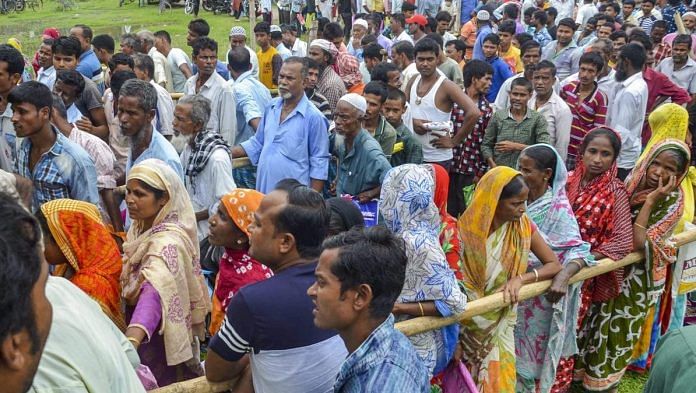Will Bengali Muslims become stateless in the near future? That is the question being asked this Lok Sabha election with the BJP viewing the NRC as a potential tool for deportation, Mamata’s Banerjee’s TMC playing electoral games to garner Muslim votes and Bangladesh denying migration of its people into India.
It will perhaps not be a surprising scenario if the Bengali Muslims turn out to be the next prospective group of people in the Indian sub-continent to become stateless.
The NRC
Last July, when the first draft of the National Register of Citizens (NRC) was published in Assam, it was feared that four million inhabitants would be declared as non-Indians or in other words, “stateless.” Subsequently, this fear was drummed up by chief minister Mamata Banerjee of neighbouring West Bengal. Banerjee said the NRC would lead to a ‘civil war’ in India as she viewed the step taken under the BJP-led central government and state government of Assam as a way of targeting people who are native Bengali-speakers, especially those who are Muslims.
According to the 2011 Census, after Jammu and Kashmir, the states with the highest density of Muslims are Assam and West Bengal, which have Muslim populations comprising of 34 per cent and 30 per cent respectively.
Over the past decades, there have been concerns over how economic migration from Bangladesh has changed the religious demography of these two states. The subject of migration from Bangladesh to India has often been used as an electoral tool. Thus, amidst the drama of this Lok Sabha election, the ‘Bengali Muslim’ factor worth noting.
Also read: The Citizenship Bill complements NRC in pushing BJP’s Hindutva agenda: here’s how
Partition & politics of fear
To understand the politics of fear generated by the publication of a draft NRC, one needs to go back to India’s Partition in 1947.
The usual story of Partition is that when the Radcliffe Line was drawn across the provinces of Punjab and Bengal, millions of people left their homes and the following division led to a complete movement of minorities in the new bordering areas —Muslims to Pakistan and Hindus to India.
This is, however, a very ‘Punjab-centric’ story. The dynamics in Bengal and surrounding areas were quite different, and the population migration was carried out much slower.
In 1971, during the nine months of the war that led to the creation of Bangladesh, millions took refuge in the surrounding Indian states because the Pakistan army launched a campaign of genocide in then East Pakistan. Today, substantial numbers of Muslims are present in the states of India bordering Bangladesh. Not surprisingly, Mamata Banerjee’s approach in stirring up the NRC issue has to do with wooing the Muslim voters of her state, who make up a significant vote bank of the ruling Trinamool Congress (TMC).
More recently, the hooliganism of TMC workers in certain Muslim majority areas of West Bengal was seen when they reportedly barred Hindus from casting their vote for the BJP in the second phase of elections. Certain party members of the TMC even had two popular Bangladeshi actors, Ferdous Ahmed and Gazi Abdun Noor, campaigning for them.
Also read: Muslim votes matter: Here’s how they voted for BJP after 2014
Bangladesh’s denial
Meanwhile, whereas Bangladesh’s negative public sentiment towards India is largely driven by alleged border killings of its citizens by the Border Security Force (BSF) and the debacle of the Teesta Water Sharing Treaty, the issue of undocumented migration to India for economic reasons is not something discussed at all by the Bangladeshi media.
In fact, Bangladeshi policymakers, as well as the general public, do not even acknowledge that their citizens had migrated to India. Last year in October at a conclave organised by India Today, Gowher Rizvi, the international affairs adviser to the prime minister of Bangladesh, said that the Indian establishment needs to show evidence of Bangladesh’s citizens being present in India for his country’s establishment to take any concrete steps. Rizvi’s answer was followed by the statement of Ram Madhav, BJP’s national general secretary, who was present in the audience. He said that now only the “detection” phase of the NRC has been completed, but the next two phases of “deletion” from electoral rolls and “deportation” are yet to happen. Madhav appeared to imply that only during the third phase of “deportation” will Bangladesh be notified about who has been deemed a “Bangladeshi”.
With Bengali Muslims caught in this game of ping pong, hopefully, the dynamics of the 2019 election cycle in India will not result in a situation where the world will have to witness something similar to what happened to the Rohingyas of Myanmar— many of whom are languishing in refugee camps in Bangladesh.
The author defended her PhD recently at the School of Government and International Affairs, Durham University (UK). Views are personal.




Bengali Muslims are neither Muslim or Bengali these days. No body want to own them . They are lost in oblivion. I feel pity for them . Bengal is still under influence of Muslim not Bangaladeshi Muslim. They should support BJP for survivals or be treated as Rohingya.